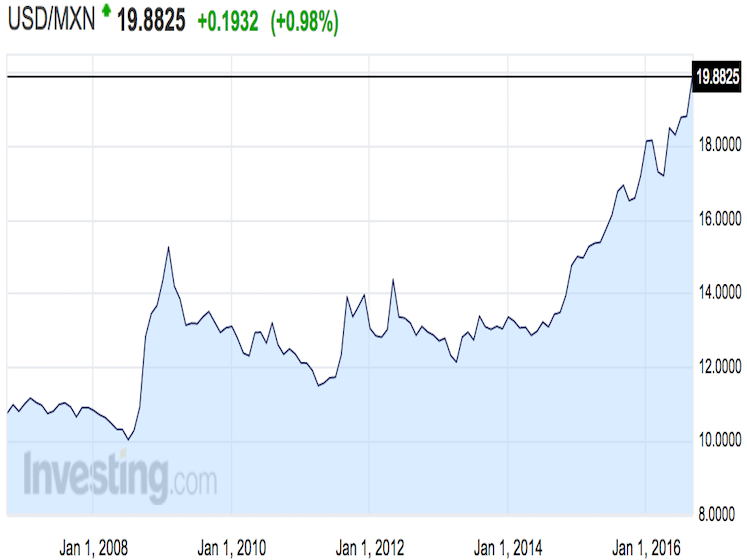The Mexican peso fell to new lows against the dollar on Tuesday.
The currency is down by 0.93% at 19.873 per dollar as of 1:48 p.m. ET. It fell to as low as 19.6044 earlier, below the psychologically key level of 20.
The peso has tumbled through much of September, underperforming emerging-market currencies.
“We’re still hesitant to go to the old ‘Trump Factor’ here but continued peso underperformance is hard to explain,” said Marc Chandler, global head of currency strategy at Brown Brothers Harriman, in a note on Tuesday.
Republican presidential nominee Donald Trump has gained traction in polls against his Democratic rival Hillary Clinton, and the notion is that a Trump presidency would be bad for Mexican assets.
The Russian ruble is also sliding. The currency is down by 0.3% at 64.8519 per dollar as of 1:52 p.m. ET.
Meanwhile, Brent crude oil, the international benchmark, is lower by 0.65% at $45.66 per barrel.
Separately, data released on Monday suggests that the Russian consumer continues to struggle.
Retail sales fell by 5.1% year-over-over in August, compared to July's revised down 5.2%. Plus, real wages contracted by 1.0% year-over-year in August.
As for the rest of the world, here's the scoreboard as 7:45 a.m. ET:
- The Japanese yen is little changed at 101.79 per dollar ahead of the Bank of Japan's meeting. The Japan Times reports that there's been growing speculation the bank will tweak its bond-buying program to include the purchase of more short-term bonds in an effort to steepen the yield curve. "We do not feel that the BoJ has any bazookas in its arsenal to shock the markets even if it were to ease tomorrow," wrote Deutsche Bank strategist Taisuke Tanaka in a note to clients. "As we have already seen this year, a BoJ easing is unlikely to have any sustained downward impact on the yen if the US economic momentum is waning." The US dollar index is little changed at 95.99. "The Fed leaving the door for a December rate hike wide open has the potential to push December rate expectations by up to 60%, but should the Fed revise its economic projections lower and reduce its terminal rate projection then the USD should receive little support from here," wrote Morgan Stanley's Hans W. Redeker in a note to clients. The euro is little changed at 1.1162 against the dollar after German PPI dipped 0.1% month-over-month in August, below expectations of a 0.1% increase. TheBritish poundis down by 0.4% at 1.2973 against the dollar. Separately, here's how big London losing its financial passport could be.The Australian dollar is up by 0.1% at 1.3256 per dollar.
